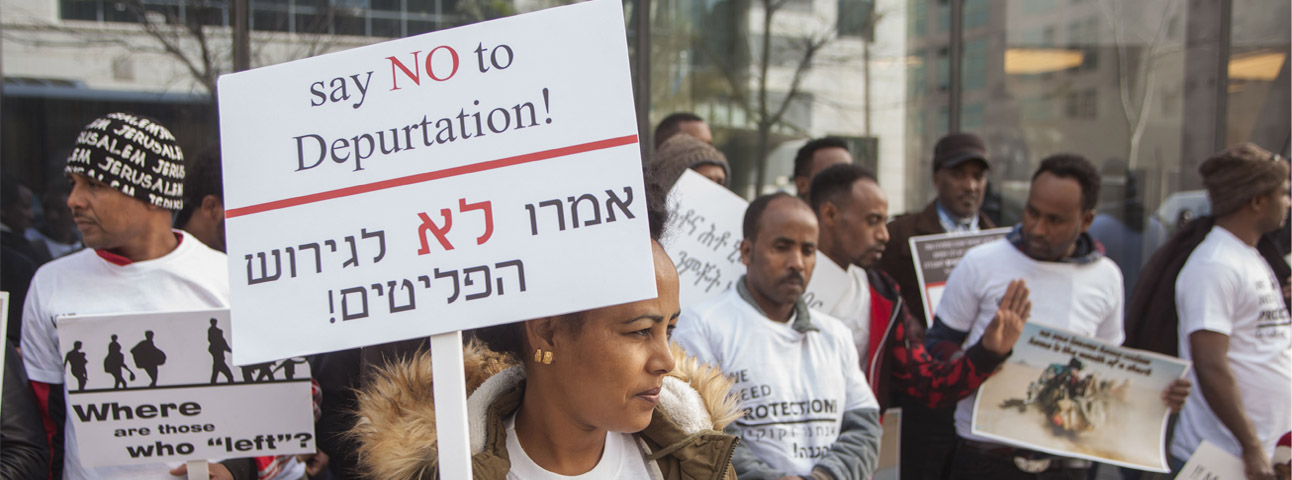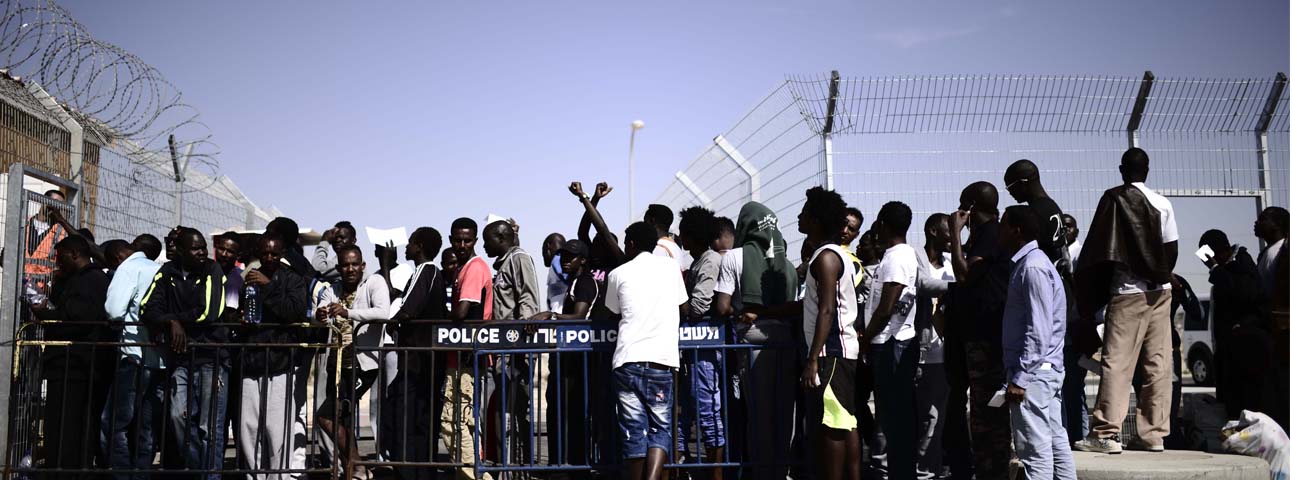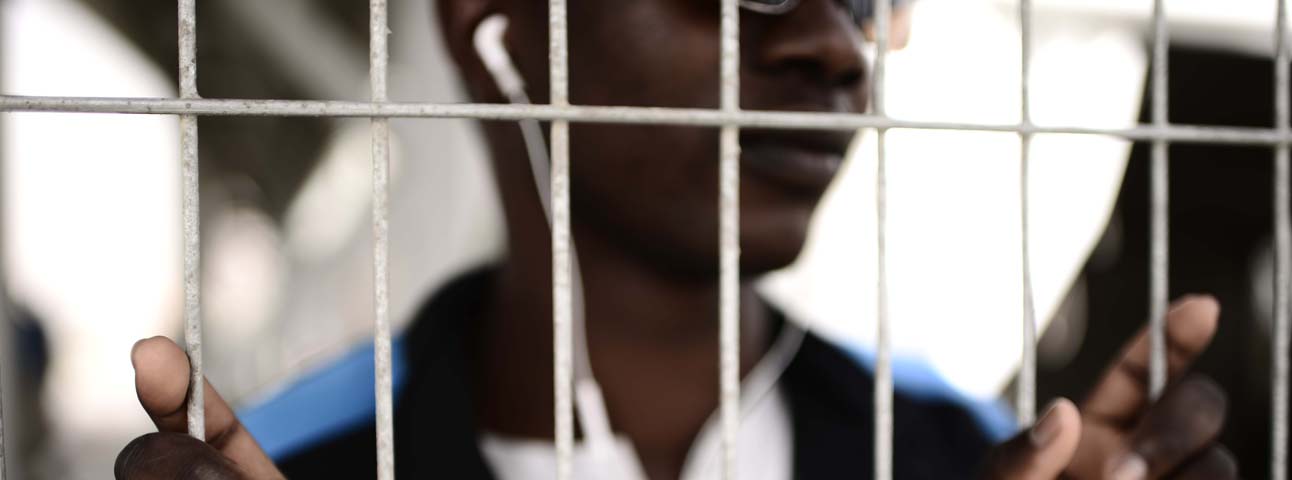Questioning the Legality of Deporting Eritrean and Sudanese Asylum Seekers from Israel

On 1 January 2018, the Israeli government announced plans to indefinitely detain or forcibly 'relocate' thousands of Eritrean and Sudanese asylum seekers to ‘third countries’ in Sub-Saharan Africa, should they refuse to leave voluntarily (and receive a lump sum payment of USD 3500) by 31 March 2018. Israel’s Population, Immigration, and Border Authority (PIBA) advertised 100 new posts for inspectors to work in the ‘voluntary repatriation programme’ and others to enforce laws against asylum seekers and their employers (report).
Israel defines all 35,300 Eritreans and Sudanese (mostly from Darfur) as ‘infiltrators’ that illegally crossed its border from Egypt. In contrast, UNHCR maintains that “the protection needs of the majority of Eritreans and Sudanese [in Israel]…are akin to the protection needs of refugees’ and that UNHCR ‘considers them to be in a refugee-like situation”.
In August 2017, the Israeli Surpeme Court enjoined the state from indefinitely holding prospective deportees in detention until and unless they agree to leave, finding such consent to be ipso facto given involuntarily. The court, however, did not find fault with involuntary removal per se; rather, its permise was that deportation is undertaken pursuant to agreement(s) with (undisclosed) ‘third state(s)’ and that such agreemets require consent (see my earlier post).
The revised deportation procedure (Hebrew) prompted strong reactions from North American and British Jewish groups, demonstrations, as well as condemnations from Israeli doctors, artists, academics, social workers, restauranteurs, authors, and rabbis from all religious streams (all sources in Hebrew). Pubic outrage notwithstanding, the deportation plans represent a steady progression of Israel's asylum policy, and certain parallels can be drawn to relocation/third country agreements pursued by other countries (and supranational organisations such as the EU) when returns to countries of origin are impermissible or impracticable.
There are, however, three main features that make the context and content of Israel’s plans particularly troubling and which justify the global attention they have drawn.
First, secrecy and enforcement: Israel alleges that, the (presumably revised) transfer/relocation agreements it has reached no longer require the deportee’s consent. In turn, both Rwanda and Uganda (the ‘third countries’ earmarked to receive the deported asylum seekers) denied the existence of such agreements. The Government of Rwanda tweeted that “…[it] has never signed an secret deal with Israel regarding the relocation of African migrants”. The Ugandan State Minister for International Relations, Henry Okello Oryem asserted that “that’s fake news”. Meanwhile, in an interview to the Washington Post, Eritrea’s dictator Afwerki criticised the proposed policy for selling Eritreans short as, according to him, they deserve 50,000 USD for their suffering.
How can a denied undisclosed agreement be properly supervised, let alone commitments regarding the safety, security, livelihood of deportees made therein enforced? A secret relocation/transfer agreement to a country other than the deporteee’s country of nationality is unprecedented.
The procedural gap ties in with emassing information regarding a substantive protection gap. Israel alleges that deportees will have prospects of long-term residence in dignity in the ‘third state’.
On 17 November 2017, UNHCR’s Assistant High Commissioner for Protection, Volker Türk noted that “[d]ue to the secrecy surrounding this policy and the lack of transparency concerning its implementation, it has been very difficult for UNHCR to follow up and systematically monitor the situation of people relocated to these African countries. UNHCR, however, is concerned that these persons have not found adequate safety or a durable solution to their plight and that many have subsequently attempted dangerous onward movements within Africa or to Europe”.
Better a prison in Israel than dying on the way
On 4 December 2017, the Committee against Torture’s Second Period Report of Rwanda expressed concern [46] “at the reported delays to register asylum seekers, placing them at risk of being deported” as well as “the difficulties to access the asylum procedure faced by Turkish residents as well as Eritreans and South Sudanese relocated from Israel, some of whom have reportedly been forcibly expelled to neighbouring countries”. It urged Rwanda to [47](b) “[e]nsure that all asylum seekers without restriction relating to nationality or profile of the claim are issued with temporary residence permits and their claims are processed within the legal time-frame”.
On 9 January 2018, following the announcement of Israel’s new policy, UNHCR urged Israel to halt its deportation plans, noting (based on interviews conducted in Rome with 80 Eriteans) that “forced relocation to countries that do not offer effective protection and the onward movement of these people to Libya and Europe is particularly worrisome”.
Most damningly is a report published this week, ‘Better a prison in Israel than dying on the way’, based on qualitative research of 19 interviews conducted in Germany and the Netherlands with Eritrean refugees who, like thousands of Eritrean and Sudanese, were pressured to ‘voluntarily’ depart Israel to Rwanda and Uganda in the years 2014-2016 and subsequently made it to Europe after a long and dangerous journey (read HRW report on Israel’s coercive pressure to leave). Instead of refugee status and work permits, as promised by the Israeli government, deportees were stripped of their travel document (the only identifying document in their possession) upon arrival in Rwanda. Exposed to robberies, threats and arrest, they were smuggled onwards on a dangerous journey through South Sudan, Sudan, and Libya in search of safety. They were subjected to human trafficking, incarceration, the threat of forcible deportation to Eritrea, harsh conditions of starvation, violence and slavery in torture camps in Libya and a dangerous crossing of the Mediterranean Sea onto Europe.

Hence, it appears that deportees from Israel had faced a risk of chain (or indirect) refoulement, in breach of states’ refugee and international human rights law obligation not to expel or return (refouler) a person to territories where his or her life or freedom would be threatened, or where they face risk of being subjected to torture and cruel, inhuman or degrading treatment or punishment.
Second, time and ties: the practice regarding ‘Safe third country’ (STC) agreements assumes that asylum seekers have spent considerably little time in the transferring country, and are unlikely to have established ties to its society. Even Dublin regulation III (concerning removal to another EU member state) sets in Article 29(1) a six months ‘ceiling’. Since the erection of a physical barrier on the Egyptian-Israeli border in 2012, there have been virutally no new arrivals. Hence, the vast majority of Eritrean and Sudanese in Israel have resided there for at least six years, and in some cases closer to a decade, establishing significant ties with Israelis in all walks of life.
During that period, PIBA has issued them renewable Conditional Release Visas (pursuant to Section 2(A)(5) of the Entry to Israel Act) leaving them in a precarious status, albeit a legal one. It could be forcefully argued that, given that refugee status is merely declaratory, deportees from Israel are entitled to Article 32 protection from expulsion to any country ‘save on grounds of national security or public order’. This is a far stronger protection than non refoulement, as it requires individual assessment of the risk posed by the deporteee. It is noteworthy that the new Israeli procedure will apply also to those applying for asylum after 1 January 2018 whose applications are pending.
The mirror image of the ‘time and ties’ argument is the fact that, STC agreements are often concerned with return to a country through which the person had passed en route to the country of asylum; not only do Eritrean and Sudanese have clear links to Israel, given their long-term stay, they do not have any links to Rwanda and Uganda.

Third, Israel’s dysfunctional asylum system: current deportation plans must be considered against the backdrop of data presented (Hebrew) by PIBA to the Israeli Parliament in December 2017. The data reveals that, of 12,295 Eritreans and Sudanese who had submitted asylum applications, only 10 Eritreans and one Sudanese were recognised as refugees: fewer than 0.1%. The Israeli Supreme Court has recently criticized PIBA for refusing to determine the status of some 2,300 Darfuri applicants.
In comparison, in EU member states, in the third quarter of 2017, recognition rates of Eritrean and Sudanese as refugees and/or beneficiaries of subsidiary protection were 90% and 60%, respectively (for further discussion of Israel’s asylum ststem, see my JIANL article and the Hotline for Refguees and Migrants’ report). Notwithstanding three ad hoc arrangements made in respect of refugees from Darfur, the first in 2007 (upon arrival of the first 600 refugees) and two recent announcements that 500 additional Darfuris will be granted leave to remain, Israeli law fails to accord subsidiary protection status to persons to whom Israel does not generally refugee status, but who nevertheless cannot be returned to their countries of origin.
Concluding comments
The Israeli government’s plans to deport en masse thousands of persons in need of international protection to undiscolsed ‘third contries’ pursuant to secret (denied, and effectively unenforcable) agreements are deeply troubling from a refugee and human rights law perspective. They should be called off.
